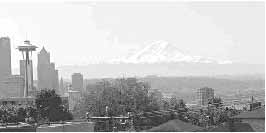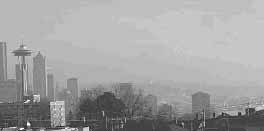Tax Pollution, Not Income
The new millennium needs a new tax strategy
by Alan Thein Durning, special to the Washington Free Press
This year, Earth Day falls on April 22. It is ironic that it comes a week after the tax-paying deadline of April 15.
On Earth Day we call attention to our deteriorating environment loss of habitat and wild areas; sprawl that forces people into their cars; global warming; toxics in the home, schools, parks, and public lands; and vast waste of resources in our rich society.
But more and more people are starting to realize that our environmental problems are encouraged in great part by the lopsided, illogical taxes we all pay every April 15.
Our tax system penalizes good things like personal income and home or business ownership, and rewards bad things like sprawl, pollution, single-occupancy driving, and tearing up rural land for homes.
When you tax something, you get less of it. That's the stuff of Economics 101. So what do we tax? Mostly, we tax things we want more of, such as paychecks and enterprise, not things we want less of, such as pollution and resource depletion. Naturally, we get less money and more messes.
Doing the opposite would yield double dividends cleaner air and flusher bank accounts. In our book,
Tax Shift, Northwest Environment Watch researcher Yoram Bauman and I describe how to tax "bads" rather than "goods" here in Washington.
A tax shift would grow our state economy by at least $2.5 billion a year. It would also steer billions of daily decisions toward environmental sustainability. Along the way, it would relieve gridlock and save lives by reducing the environmental contamination and traffic accidents that kill more than 2,500 Washingtonians each year.
Sounds too good to be true? Well, don't take it from me. Some 2,600 economists including eight Nobel Laureates recently endorsed tax shifting to respond to global climate change. Environmental taxes put hidden environmental costs childhood cancers caused by pollution, for example, and flood damage caused by paved watersheds into businesses' ledgers. They make prices tell the ecological truth. As
The Economist
says, "green taxes are good taxes."
So, whether you think government is too big or too small, the logic of shifting taxes is compelling. Since 1991, it's convinced six European nations to start moving taxes off work and onto pollution. And it's prompted legislatures in three states to consider following suit. So far, however, the idea lacks champions in the Northwest.
Here are some examples of how it could work.
Tax pollution and scrap business taxes
More than 3.5 billion pounds of harmful pollutants 100 million pounds of them highly toxic flow into the Northwest's environment each year. Lifelong exposure to these pollutants kills thousands of Washingtonians. Where pollution comes from a factory, we can tax every pound of pollution and toxic waste, piggy-backing on existing regulatory fees. But pollution that does not come from factories is a growing menace. Pollution washing off farms is the biggest threat to water quality in our rivers. Motor vehicles cause about half of urban air pollution, and the dirtiest fifth of vehicles spew four-fifths of the smog. To tame these nonfactory polluters, we can tax agrochemical sales and, at our regular vehicle inspections, tailpipe emissions. Pollution taxes would raise $1.7 billion a year in Washington. That's enough money to eliminate the state's third-place revenue source, the business and occupations (B & O) tax. Perverse in its impacts, the B & O tax penalizes start-up firms and hits some industries unfairly. Clean, service-sector companies pay at three times the rate of resource extractors; nonprofit hospitals pay at five times the rate of nuclear fuel manufacturers.

|

|
|
Visibility of Mt. Rainier, the Cascades, and Olympics from Sea-Tac Airport dropped one-third between the late 1980's and 1994, when readings stopped (Puget Sound Regional Council). Taxing tailpipe emissions would help to reduce the smog and improve the view.
|
Tax resource consumption and slash the sales tax
To encourage conservation and recycling and to reflect the environmental impacts of resource extraction governments could tax water, hydropower, timber, and minerals. Taxing diversions of water from rivers would stem the enormous inefficiency in irrigation water use in the Northwest and safeguard life in our rivers. A tax of 6¢ per 1,000 gallons would drive a revolution in farm-water conservation. Still, it would raise the price of an order of french fries from Washington potatoes by at most 0.05¢ and the price of a hamburger with all the fixings by 4¢ or less. To reflect the decimated salmon runs and other consequences of damming rivers, Olympia could tax hydropower. It could also embrace power deregulation and through taxes on private dams and treasury contributions from public dams claim any windfall profits that deregulation brought. Just as oil royalties pay for much of Alaska's government, hydropower royalties could help pay for Washington's. These and other natural resource taxes would generate $1.8 billion in Washington each year, enough to replace one third of state and local sales taxes. Washington's extreme reliance on the sales tax give us the country's most regressive tax system. The poorest fifth of Washington households spend three times as much of their incomes on state and local taxes as do the richest fifth. Middle-class families spend twice as much of their incomes as do the rich.
Tax land values and control sprawl
Most Northwest jurisdictions fight sprawl with land-use regulations; none applies taxes to the same task. Yet shifting the property tax off of buildings and onto land values would turbocharge growth management, spurring investment in city and town centers and adjacent neighborhoods. This reform would more than double taxes on parking lots and vacant lots in developed areas, increase taxes by up to one-quarter on car-oriented strip development, and moderately reduce taxes on pedestrian-oriented neighborhood shopping districts. It would reduce taxes by about one-third on apartments and condominiums and by about five percent on most single-family residences. So underused sites would fill with workplaces and residences, moderating rental prices and relieving pressure on rural lands.
Tax Traffic and Ease Gridlock
To ease the traffic congestion that threatens to choke our cities, localities could tax rush-hour driving on busy routes. Collected by "phantom tollbooth" scanners, which deduct tolls from prepaid smart cards posted on cars' dash boards, traffic taxes would rise with congestion. The best kept secret among transportation experts is that such tolls are the only cure for gridlock. Even if we in the central Puget Sound area dig up almost $1 billion extra each year to spend on mass transit and highways, as called for in our approved transportation plan, afternoon gridlock will still spread to almost half the freeway network and the time we spend stuck in traffic will triple by the year 2020. Tolls, on the other hand, could tame congestion while generating $1 billion a year, allowing repeal of many local taxes.
Tax greenhouse gases and slash payroll taxes
To reduce emissions of greenhouse gases, we could phase in a national tax of $100 per ton of carbon dioxide. That would raise enough money in Washington to slash payroll taxes on the typical working family by $852 a year, far more than they'd pay out in higher fuel prices an extra 8¢ per gallon of gasoline, for example. Lowering payroll taxes is the best deal in a federal tax shift because payroll taxes are antiwork and viciously regressive. Some 70 percent of American households contribute more in payroll taxes than in income taxes. Payroll taxes are popular because the proceeds are supposedly reserved for retirement and unemployment benefits, but much of the money sloshes into Congress's general fund in the form of low-interest loans from the Social Security Trust Fund.
Overall, the new green taxes I've described, along with existing gas taxes and a few other taxes worth keeping, could cover 86 percent of state and local revenue in Washington. We could abolish the B & O tax and lower the sales tax by more than half!
The sweeping tax shift I've laid out here illustrates some of the options, but there are plenty of others. More important, a tax shift need not be so sweeping, nor need it come all at once. We can implement it piecemeal over years, adjusting as we go. And if the idea seems too novel to gain acceptance, just remember that the first proponents of the federal income tax were dismissed as wild-eyed dreamers a century ago. In those days, customs duties paid for our federal government.
No doubt, winning a tax shift will require some form of citizen tax revolt the latest in the long line dating back to the Boston Tea Party. At the state level, it may require a citizen initiatives, because Initiative 601 tied the legislature's hands by requiring a two-thirds majority in each house to change taxes. But an initiative might do well, because the immediate benefits would be huge for many families.
If you're part of a typical middle-class family in Washington mom, dad, one kid and an income of about $50,000 you probably paid about $3,800 in sales tax and $1,400 in property tax last year. (You also shelled out about $5,200 in federal income tax and $3,800 in payroll taxes.)
Under a tax shift, you'd pay tax in proportion to the damage you caused to others and the environment. If you, like many, are a careful steward of our shared Northwest, you'd save a bundle. And the greener you made your lifestyle or business, the less you'd pay. Your conscience and your bottom line would, at long last, agree.
Alan Thein Durning is executive director of Northwest Environment Watch (NEW) in Seattle and co-author, with researcher Yoram Bauman, of
Tax Shift: How to Help the Economy, Improve the Environment, and Get the Tax Man Off Our Backs
($9.95,
www.northwestwawch.org, 206-447-1880).

